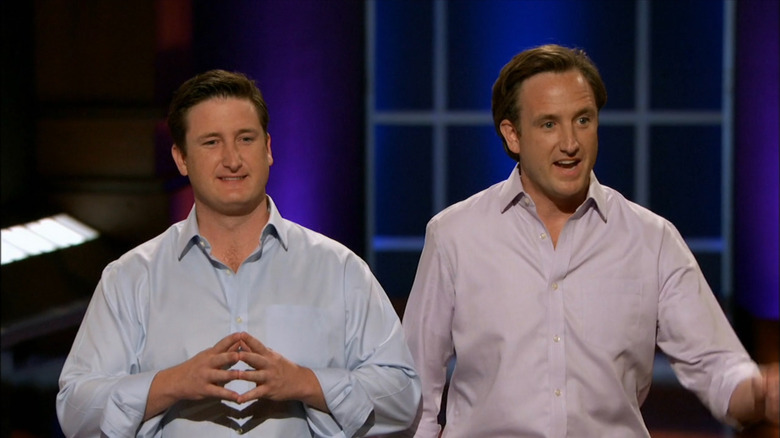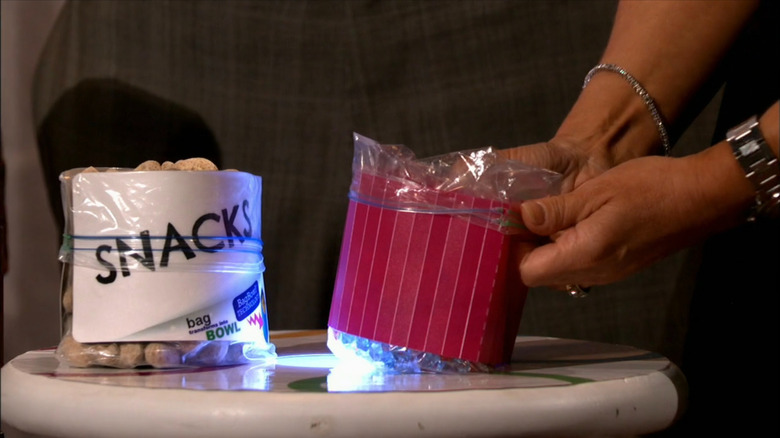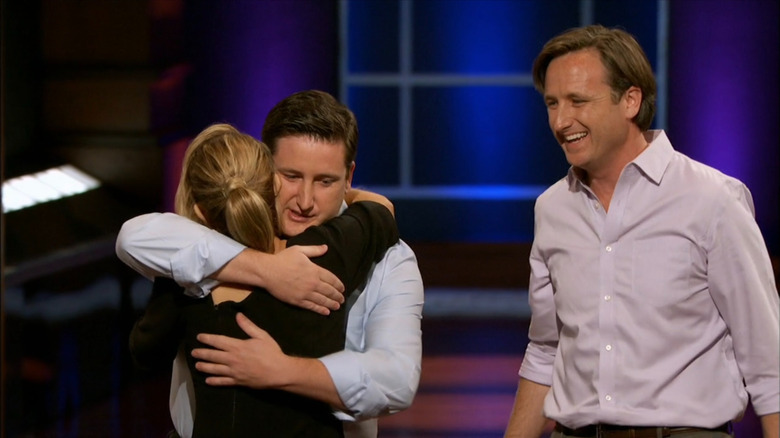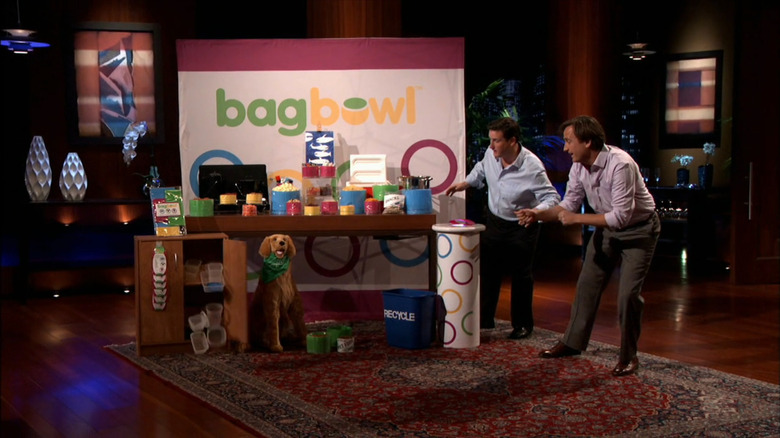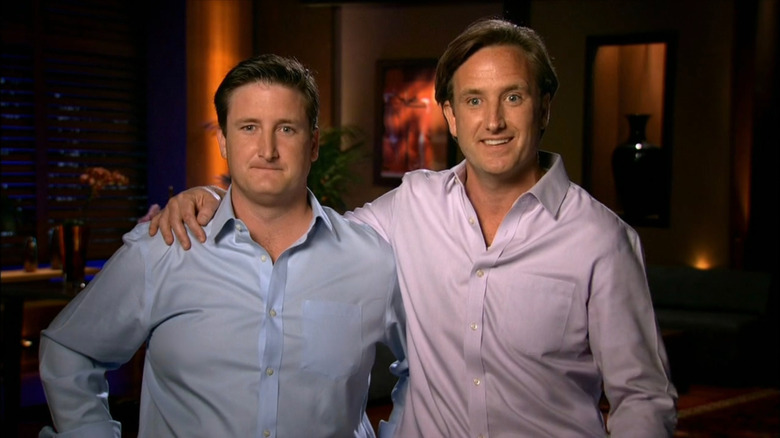Where Is BagBowl From Shark Tank Today?
We may receive a commission on purchases made from links.
If you watched "Shark Tank" long enough, you probably remember the episode where two brothers barked and growled their way into the Tank with a gadget that turned chip bags into makeshift bowls. That product was BagBowl, a collapsible sleeve designed to give snack bags a sturdier frame. It wasn't the kind of invention that screamed Silicon Valley disruption, but it had a certain late-night-infomercial charm — the kind of thing you could imagine tossing into a camping kit or pulling out at a Super Bowl party.
BagBowl's roots were much less glamorous. Co-founder Kevin Fleming had simply wanted an easier way to bring water for his dog to the park, so he fashioned a makeshift ring out of tape and popsicle sticks. His brother Brian Fleming, a real estate pro with a knack for marketing, saw potential in Kevin's tinkering. Together, they filed for a patent, tested the waters in Walmart's "Get on the Shelf" contest, and decided that "Shark Tank" was the stage where BagBowl might transform from dog-park hack to household name.
What happened to BagBowl on Shark Tank?
When the Flemings hit the Tank in 2012, they came in hot — literally barking and hamming it up while demonstrating how their plastic sleeve could turn a floppy bag into a functional bowl. They asked the Sharks for $40,000 in exchange for 33% equity, a modest request that got more attention for the performance than the product. Mark Cuban immediately bristled at being called "Cubes," dismissing them as "wantrepreneurs." Daymond John and Kevin O'Leary quickly bowed out, too.
Robert Herjavec showed some interest, dangling $40,000 for 45% of the company, but the real drama came when Lori Greiner stepped in. She matched the brothers' original ask and pitched BagBowl as a QVC-friendly item she could sell by the truckload. After some awkward stalling (and some playful Shark heckling for negotiating on camera), the brothers accepted Greiner's deal. BagBowl got its primetime moment, complete with the kind of comic theatrics that still surface in "Shark Tank" highlight reels today.
BagBowl after Shark Tank
Landing a deal with Lori Greiner gave BagBowl momentum, but the rollout wasn't instant. When the episode first aired, shoppers went looking and found empty shelves. The Fleming brothers had to work through manufacturing hiccups before orders could be filled, and weeks went by before the product was actually in customers' hands. By the end of 2012, units were finally shipping, with the brothers promising additional designs down the line — from colorful patterns to versions tailored for specific occasions.
Rather than stop there, Brian Fleming and Kevin Fleming leaned into the role of kitchen-table inventors. They launched a second venture called Daddio Designs, which they positioned as a playground for clever, stress-saving gadgets. One early product was the Spill Stopper Training Cup, meant to help parents dodge the mess of toddler spills. Trade shows and press outreach followed, with the Flemings eager to show they weren't just a one-gadget story. Their branding leaned on personality as much as practicality: two self-made entrepreneurs who enjoyed having fun with their ideas while trying to carve out a space in a crowded market.
Still, translating "Shark Tank" buzz into long-term traction is easier said than done. BagBowl made it onto Amazon, but it never broke out as the must-have item the brothers had hoped for. Even with Greiner's QVC clout, sales plateaued, and BagBowl gradually faded from the spotlight. The Flemings' post-show hustle was evident, but the kind of lightning-in-a-bottle moment that launches a product into ubiquity never quite materialized.
Why did BagBowl go out of business?
For a while, BagBowl lingered online as the kind of "Shark Tank" relic you might stumble across in an Amazon search. But by the mid-2010s, updates had slowed, and the brand's social media feeds went quiet in 2016. The company's website eventually disappeared, too, and what remains today are stray eBay listings where unopened starter sets sell for just a few dollars — a far cry from the "QVC hit" the Sharks had once envisioned.
The Fleming brothers officially shut down BagBowl, along with their Daddio Designs venture, in early 2018. The reasons weren't dramatic so much as familiar: Despite a clever pitch and a dose of television exposure, the product never managed to carve out enough of the market to sustain itself. Shoppers weren't clamoring for a plastic sleeve to hold up their chip bags, and without consistent sales or licensing deals with snack manufacturers, the business simply couldn't scale.
In the end, BagBowl may not have been one of the largest "Shark Tank" fails, but it stands as a reminder that even a TV deal and an inventive backstory don't guarantee long-term success. We've seen Bear Minimum from "Shark Tank" offer the Bear Bowl, and BagBowl followed a similar path — a clever idea that caught attention briefly before fading into obscurity.
What's next for BagBowl's founders?
When BagBowl and Daddio Designs folded, the Fleming brothers didn't exactly vanish. They simply moved on to pursuits that were steadier than a snack-bag gadget. Brian Fleming returned to his wheelhouse in Kansas City real estate, where he still works as a broker and markets himself as a "Shark Tank" alum. Kevin Fleming took a different route, diving into technology and marketing. These days, he's built a career in cloud computing and B2B strategy, trading trade shows and product demos for the world of data-driven growth.
Their post-BagBowl careers show how not every "Shark Tank" appearance has to define an entrepreneur forever. Similar to the founders of His & Her Bar from "Shark Tank," the Flemings followed a different path once it became clear their invention wasn't going to dominate store shelves. They may not be tinkering with plastic sleeves anymore, but both brothers have found success in their own arenas, drawing on the same entrepreneurial energy that once had them barking at the Sharks.
In the end, BagBowl lives on less as a product and more as a footnote — a reminder of how quirky pitches can capture the spotlight for a moment before fading away. For Brian and Kevin, though, the show was just one chapter in much longer careers. And if you ever want to relive the barking, growling pitch that started it all, you can still stream their episode on Amazon Prime.
